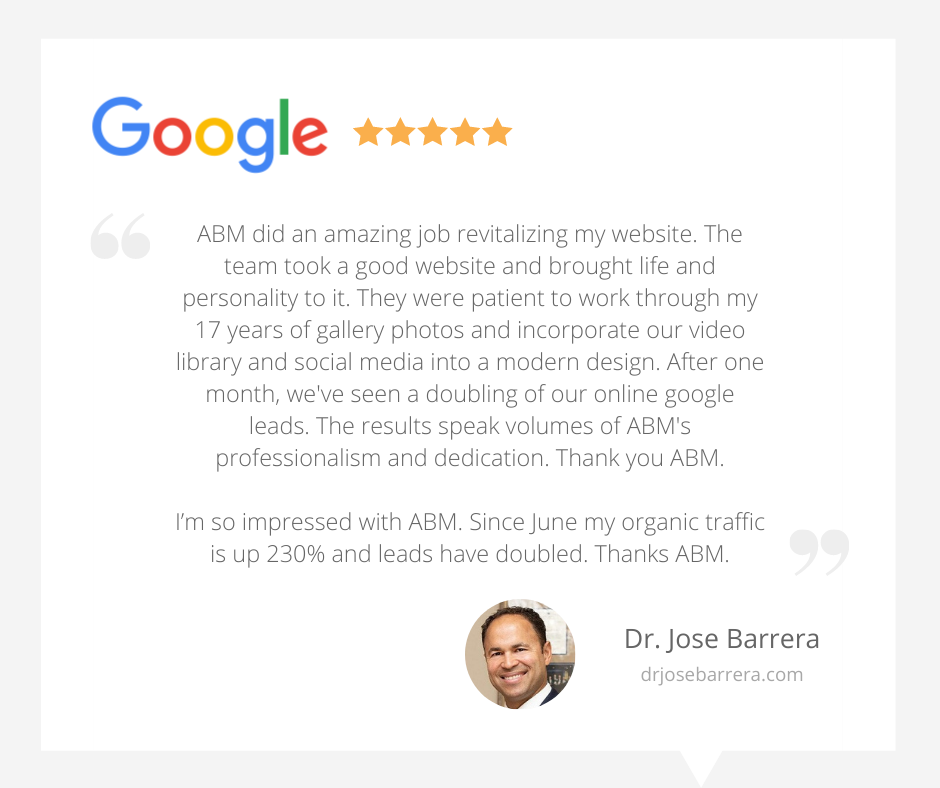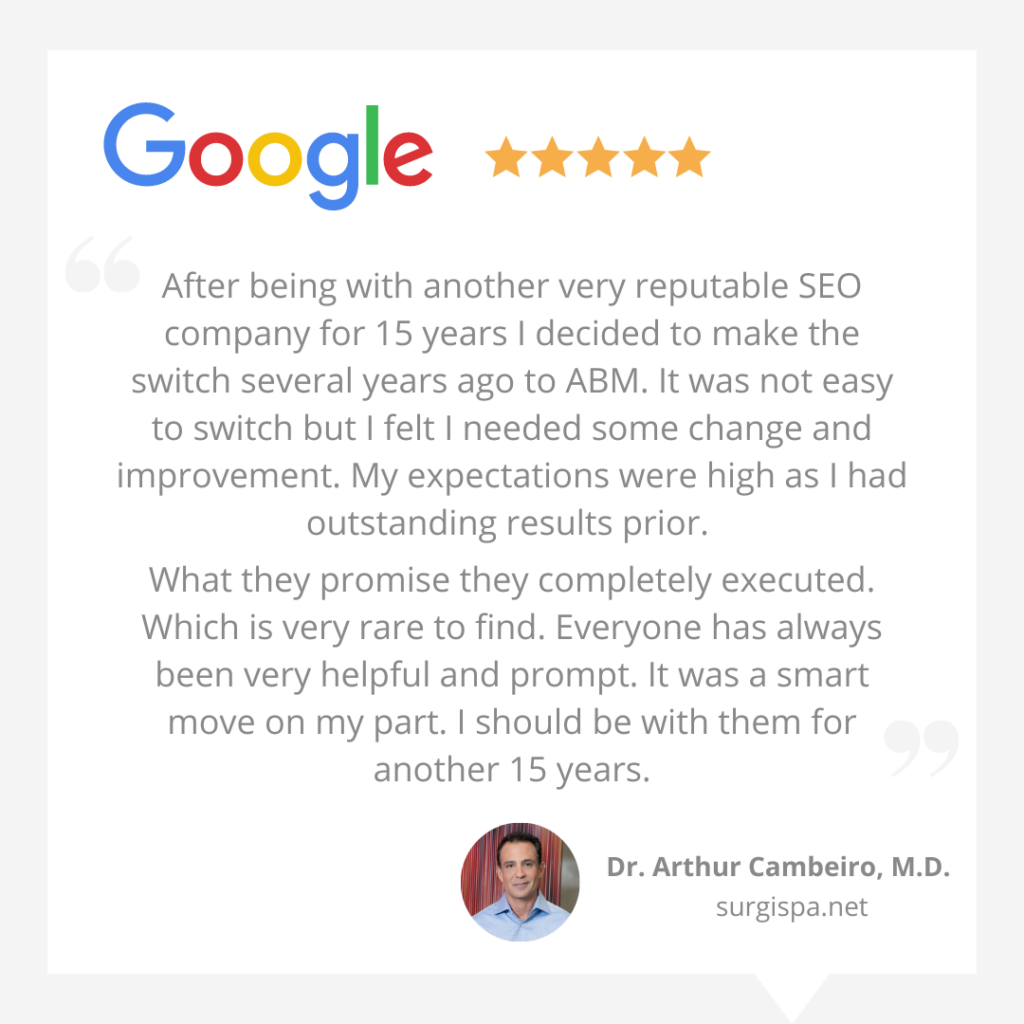Plastic Surgery SEO (Search Engine Optimization) for Aesthetic practices
What is SEO?
Plastic Surgery SEO refers to the practice of optimizing a website to rank higher in search engine results for plastic surgery-related terms. SEO (Search Engine Optimization) is crucial because it helps increase the organic traffic to a website, making it visible to potential patients actively searching for plastic surgery services.
Why is SEO Important for Plastic Surgeons and Aesthetic Practices?
In today’s digital age, most successful plastic surgery practices rely on SEO strategies to drive traffic and attract patients. Effective SEO can place your practice in front of people searching for your services at the exact moment they’re interested. It’s like having a billboard that appears when someone needs it most.
Key Strategies to Improve SEO for Plastic Surgery and Aesthetic Practices:
1. High-Quality Content
- Unique Content: Avoid copying content from other websites. Google penalizes duplicate content. Instead, create informative, well-written pages for each of your procedures.
- Comprehensive Content: Pages should have sufficient word count—often several hundred or even thousands of words—for competitive keywords. This helps improve rankings.
- SEO-Optimized Content: Use keyword research tools to identify search terms that potential patients are using. Tailor your content to answer these queries.
2. Website Structure and Coding
- Avoid using website builders like Wix or Squarespace, which are limited in SEO flexibility. A custom-built WordPress site with clean, optimized code will perform better in search rankings.
- Fast load times are critical. Ensure your website is lean, with minimal unnecessary elements that can slow it down.
3. Local SEO
- Make sure your practice’s name, address, and phone number (NAP) are consistent across all online listings to boost local search visibility.
- Implement Google My Business to help your practice appear in local searches.
4. Backlinks and Domain Authority
- High-quality backlinks from reputable websites boost your website’s authority in the eyes of Google.
5. Media (Images and Videos)
- Include professional photos and videos of your work. Media not only engages potential patients but also helps improve SEO, especially when optimized properly.
6. Website Speed
Website speed is a critical factor in your site’s search engine rankings. Search engines prioritize fast-loading websites because they can crawl more pages within a limited amount of time. The faster your pages load, the more pages search engines can index, increasing your chances of appearing in search results.
This is a direct ranking factor that Google has publicly acknowledged. If your site’s speed isn’t up to par and you’re working with a marketing company, it’s important to assess their expertise in this area.
Optimizing your website speed is one of the most controllable factors that can positively impact your rankings. If your website’s speed hasn’t been addressed yet, it’s time to discuss this with your marketing team to ensure your site is performing optimally.
7. Mobile Optimization
With the growing importance of mobile search, optimizing your website for mobile is essential for both user experience and SEO performance. Google has made it clear that mobile-friendly sites are a ranking factor.
- Avoid using software that is not supported on mobile devices, such as Flash.
- Ensure text is legible without requiring users to zoom in.
- Design content that fits appropriately on the screen without needing horizontal scrolling or zooming.
- Make sure links are sufficiently spaced to be tapped accurately on mobile devices.
Poor mobile optimization can hurt your search rankings, as Google penalizes sites that offer a subpar mobile experience. Early adopters who correctly set up mobile sites before Google started penalizing improper configurations gained a competitive edge.
Google provides comprehensive guidelines for Mobile SEO to ensure your mobile site is set up correctly. Following these guidelines is essential for maintaining a strong search presence across all devices. By investing in mobile optimization, you not only improve your site’s SEO but also enhance the overall user experience for mobile visitors.
Conclusion: By focusing on these areas, plastic surgeons can significantly improve their website’s search engine rankings, bringing more visibility and potential clients to their practices.

Frequently Asked Questions (FAQ) about Plastic Surgery and Aesthetic SEO
Why is high-quality content so important for SEO?
High-quality content helps establish your expertise and ensures that search engines understand the focus of your website. Well-written, informative content targeted toward relevant keywords answers potential patients’ questions, making it more likely to rank higher in search results. Additionally, original content avoids penalties for duplication, which could hurt your SEO rankings.
How do backlinks improve my plastic surgery practice’s SEO?
Backlinks are links from other websites to your site. When high-quality, reputable sites link to your practice, it signals to search engines that your website is trustworthy and authoritative. This can boost your rankings and visibility. Building backlinks requires creating valuable content that others will want to share and reference.
Why are images and videos important for SEO?
Including high-quality images and videos of your work makes your website more engaging and informative. Additionally, search engines like Google value multimedia content, especially when it’s optimized (e.g., using alt text, proper file sizes). This helps your practice rank better in search results and keeps visitors on your site longer.
Can using website builders like Wix or Squarespace help with SEO?
While website builders like Wix or Squarespace are easy to use, they come with limitations that can affect SEO performance. These platforms often lack the flexibility required for in-depth SEO optimization. A custom-built website using platforms like WordPress allows for better control over site speed, structure, and optimization, which can significantly improve your rankings.
How long does it take to see results from SEO for my practice?
SEO is a long-term strategy, and it can take several months before you start seeing significant results. Factors like competition, the effectiveness of your SEO strategies, and the frequency of content updates all impact the time it takes to improve your search rankings. However, with consistent effort, you should begin to see increased website traffic and patient inquiries over time.
Is Search Engine Optimization Dead?
Not at all! SEO is very much alive and continues to be a crucial part of any digital marketing strategy. While search engine algorithms and trends are constantly evolving, the fundamental principles of SEO—like creating high-quality content, optimizing for search intent, and ensuring a smooth user experience—remain vital. As long as people use search engines to find information and services, SEO will remain essential to online visibility.
Do I Have to Run Google Ads for My Plastic Surgery Practice to Be Successful?
While Google Ads can certainly give your practice a boost, especially in competitive markets, they’re not a must for success. A well-executed SEO strategy can help you rank organically, bringing long-term, sustainable traffic without the need to constantly invest in paid ads. That said, Google Ads can complement SEO efforts by targeting immediate leads while you work on improving your organic rankings.
What is local SEO and how can it help my practice?
Local SEO focuses on optimizing your website to appear in local search results, ensuring that your practice shows up when people search for plastic surgery services near them. It’s essential for attracting patients from your local area. You can boost local SEO by maintaining consistent business details (NAP) and optimizing your Google My Business profile.
Why is website speed important for SEO?
Website speed plays a crucial role in search engine rankings because search engines prioritize fast-loading websites. The faster your site loads, the more pages search engines can crawl and index, which increases the likelihood of your pages showing up in search results. Google has confirmed that site speed is a ranking factor, so ensuring your website is quick is essential for improving visibility and attracting organic traffic.
How do I know if my website speed is good enough?
You can easily test your website’s speed using tools like WebPageTest.org or Google PageSpeed Insights. These tools provide a detailed analysis of your site’s load time and offer recommendations on how to improve it. If your site’s speed is slow, you may need to optimize images, streamline your code, or reduce the number of elements on your page to improve loading times.
What are the consequences of a slow-loading website for my plastic surgery practice?
A slow website can hurt both user experience and your SEO performance. Visitors are more likely to leave a site that takes too long to load, which increases your bounce rate. High bounce rates can signal to search engines that your site isn’t offering good user experience, which can negatively impact your rankings. Additionally, slower sites are less likely to be indexed efficiently by search engines, reducing your chances of appearing in relevant searches.
How can I improve my website speed?
There are several ways to optimize your website speed:
- Compress images to reduce file sizes without sacrificing quality.
- Minimize the number of HTTP requests by reducing the number of elements on your page (such as scripts, images, and fonts).
- Use caching to store elements of your site on users’ browsers so they don’t need to reload every time.
- Optimize your code by removing unnecessary characters and reducing the size of CSS, JavaScript, and HTML files.
- Upgrade your hosting if your website is hosted on a slow server, as the server’s performance directly affects your load time.
What is mobile optimization, and why does it matter?
Mobile optimization refers to designing your website to provide a seamless user experience on mobile devices, such as smartphones and tablets. With more people using mobile devices to search for services, having a mobile-friendly site is essential for both user experience and SEO. Google has publicly stated that mobile-friendly sites are a ranking factor, so ensuring your site is optimized for mobile is crucial for maintaining strong search rankings.
How do I know if my site is mobile-friendly?
You can test if your website is mobile-friendly using Google’s Mobile-Friendly Test. This tool will let you know if your site meets Google’s mobile optimization criteria, including legible text without zooming, easy navigation, and properly sized content. If your site doesn’t pass the test, it’s time to consider optimizing it for mobile users.
What happens if my website isn’t optimized for mobile?
If your website isn’t mobile-optimized, it could negatively impact your SEO rankings. Google penalizes sites that provide a poor mobile experience, which can lead to a drop in rankings and reduced visibility in search results. Users may also leave your site if they can’t navigate it easily on their mobile devices, which could increase your bounce rate and further harm your SEO performance.
How can I improve my website’s mobile optimization?
To optimize your website for mobile, follow these best practices:
- Use responsive design, which automatically adjusts the layout based on the screen size.
- Avoid Flash, as it is not supported on most mobile devices.
- Ensure your text is readable without requiring users to zoom in.
- Make links easily tappable, with enough space between them to prevent accidental clicks.
- Optimize images and media to load quickly without sacrificing quality on mobile devices.
Why is mobile optimization such a big deal for plastic surgery and aesthetic practices websites?
As more patients search for plastic surgeons on their mobile devices, having a mobile-optimized site is essential to attract and convert them. If your site isn’t mobile-friendly, you could be losing out on a significant number of potential leads. Plus, Google’s mobile-first indexing means your mobile site is now the primary version Google uses to rank your pages. Prioritizing mobile optimization ensures your site is visible and accessible to the growing number of mobile users.
Can mobile optimization improve my search rankings?
Yes, a mobile-optimized website can directly improve your search rankings. Google considers mobile optimization as a ranking factor, meaning websites that provide a better mobile experience are likely to rank higher in search results. By ensuring your site is mobile-friendly, you not only enhance user experience but also boost your chances of being found by potential patients searching for your services on mobile devices.
How Much Does Plastic Surgery SEO Cost?
The cost of SEO for a plastic surgery practice can vary depending on factors like the competitiveness of your market, number of locations, number of providers, the scope of the services provided, and the SEO company’s expertise. Generally, you might expect to spend anywhere from $1,000 to $10,000 per month. It’s important to find a package that aligns with your goals and ensures you’re getting a solid return on your investment. Keep in mind, SEO is a long-term strategy, and results tend to grow over time.
What Other Search Engines Are There Besides Google?
While Google is the dominant search engine, there are others that can still drive traffic to your plastic surgery website. Some of the notable alternatives include:
- Bing: The second-largest search engine, often used by older demographics.
- Yahoo: Powered by Bing, but still popular in certain regions.
- DuckDuckGo: A privacy-focused search engine that doesn’t track user data.
- Baidu: The go-to search engine in China, important if you cater to international clients.
While focusing on Google is generally best for SEO, don’t ignore these other platforms if your audience uses them.
What is a Search Results Page Called?
The page that displays search engine results is typically called the Search Engine Results Page (SERP). It’s where users land after entering a search query. SERPs can include organic results, paid ads, local business listings, featured snippets, and more.
Can SEO Help Get My Plastic Surgery Website More Leads?
Yes, absolutely! A well-optimized website ranks higher in search results, driving more organic traffic from people who are actively searching for plastic surgery services. By targeting the right keywords, optimizing local search, and providing valuable, informative content, SEO can help you attract more qualified leads who are interested in booking consultations or learning more about your services.
How to Find the Best Plastic Surgeon and Aesthetic SEO Company?
Finding the right SEO company for your practice requires careful consideration. Here are some tips to help you find the best fit:
- Look for experience in the healthcare or plastic surgery industry.
- Check for proven success with case studies and client results.
- Understand their approach—look for white-hat SEO techniques.
- Read reviews and testimonials.
- Schedule a consultation to evaluate fit and expertise.
Take your time in selecting an SEO partner that aligns with your goals and understands the unique challenges and opportunities in the plastic surgery field.




